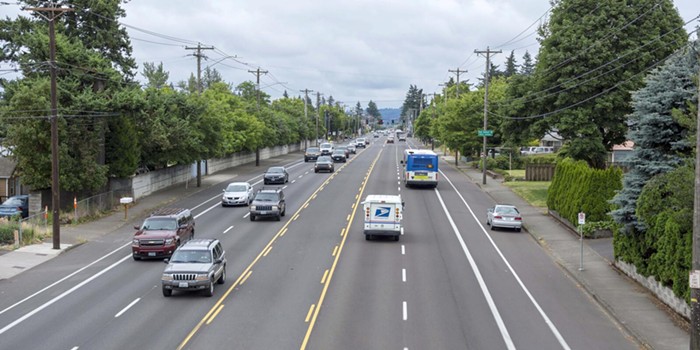
In this week's Mercury, we took a look at the city's draft policy [PDF] for police body cameras, and highlighted portions of the policy that deserve particular scrutiny as the effort goes forward.
We also wanted to compare Portland's nascent policy to body camera laws in other cities. So we got in touch with Washington, DC-based consulting firm Upturn, which in August released an audit of more than 40 cities' programs, and graded them on eight factors based on civil rights principles agreed on by dozens of organizations.
In partnership with the Leadership Conference on Civil and Human Rights, Upturn rated cities on whether:
•laws were transparent and accessible.
•officers had limited discretion on when they can press record
•victims and witnesses are duly protected
•cops are prohibited from viewing footage before a report
•departments are required to delete footage that doesn't capture anything of note
•there are safeguards against tampering
•complaining citizens can access the recordings
•biometric technology like facial recognition is limited
Cities that met expectations for a given category got a green check mark. If the expectations were partly met, they got a yellow circle. Policies that didn't address the factors or had bad policy got a red X. It looks like this.

The Mercury wondered how Portland's policy stacked up. It didn't do great.
The draft policy met expectations in just two categories, according to Upturn's Miranda Bogen. One category received a yellow circle. The rest got Xs.
At least one of those is a bit unfair. Portland's body camera policy doesn't specifically address biometric technology because it doesn't have to—the state's body camera law already prohibits it. Bogen said that doesn't matter.
"Because we believe part of the purpose of body cam policies is to provide transparency to citizens who may not know where else to look for information on body cameras, we'd like to see references to relevant statute in the policy at the very least," she wrote in an email.
Officials stress that the draft policy will change—maybe a great deal—before it's formally implemented. Portland hasn't even purchased cameras yet. Here's what Upturn had to say about the policy, as it stands today.
Makes the Department Policy Publicly and Readily Available [RED/x]
As you said, we don't know how available it will be — but given that there is public debate about it, the PD should be actively making it available already.Limits Officer Discretion on When to Record [GREEN/Check]
The policy describes when officers should record, and requires officers to justify when they fail to record. Worth noting that the policy does not require officers to justify deactivating a camera early during an incident (unless it is for the purpose of interviewing a witness who does not wish to be recorded), which is a requirement we tend to like to see.Addresses Personal Privacy Concerns [GREEN/Check]
The policy mentions situations where privacy interests should be considered, and also specifically gives officers discretion to deactivate recording when interviewing categories of vulnerable individuals (e.g., victims of sex crimes). (The policy does not make it clear if officers may deactivate or must deactivate in those cases, however).Prohibits Officer Pre-Report Viewing [RED/x]
Officers are allowed to review footage before writing reports. While the policy mentions an exception in use of force cases or in-custody deaths that are being investigated, and notes that viewing in those cases can only be authorized by the Commander of Detectives or the Captain of Professional Standards (or their designee), it does not specify the conditions under which that authorization may be granted so there is no guarantee that a report will be written prior to viewing.Limits Retention of Footage [RED/x]
The policy sets the retention period for unflagged video capturing standard calls for service at 180 days, which we do approve of. However, the policy does not explicitly mandate the deletion of footage or expressly say footage will be deleted automatically at the end of that period. The system may indeed delete footage according to that schedule, but we can't be sure given the policy language.Protects Footage Against Tampering and Misuse [YELLOW/Circle]
The policy prohibits editing, deleting, copying and sharing of video, and prohibits viewing of video not related to officers' own incidents except for training. However, the policy does not note that access to footage is audited or logged.Makes Footage Available to Individuals Filing Complaints [RED/x]
The policy references a public records request process but does not expressly allow individuals who are filing police misconduct complaints to view all relevant footage.Limits the Use of Biometric Technologies [RED/x]
Does not address


















